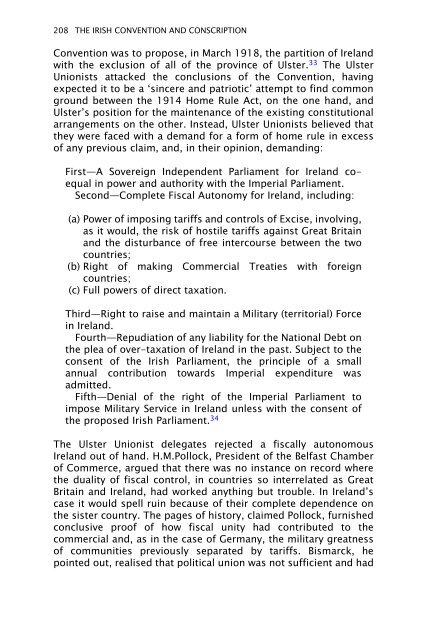Dividing Ireland: World War I and Partition
Dividing Ireland: World War I and Partition
Dividing Ireland: World War I and Partition
Create successful ePaper yourself
Turn your PDF publications into a flip-book with our unique Google optimized e-Paper software.
208 THE IRISH CONVENTION AND CONSCRIPTION<br />
Convention was to propose, in March 1918, the partition of <strong>Irel<strong>and</strong></strong><br />
with the exclusion of all of the province of Ulster. 33 The Ulster<br />
Unionists attacked the conclusions of the Convention, having<br />
expected it to be a ‘sincere <strong>and</strong> patriotic’ attempt to find common<br />
ground between the 1914 Home Rule Act, on the one h<strong>and</strong>, <strong>and</strong><br />
Ulster’s position for the maintenance of the existing constitutional<br />
arrangements on the other. Instead, Ulster Unionists believed that<br />
they were faced with a dem<strong>and</strong> for a form of home rule in excess<br />
of any previous claim, <strong>and</strong>, in their opinion, dem<strong>and</strong>ing:<br />
First—A Sovereign Independent Parliament for <strong>Irel<strong>and</strong></strong> coequal<br />
in power <strong>and</strong> authority with the Imperial Parliament.<br />
Second—Complete Fiscal Autonomy for <strong>Irel<strong>and</strong></strong>, including:<br />
(a) Power of imposing tariffs <strong>and</strong> controls of Excise, involving,<br />
as it would, the risk of hostile tariffs against Great Britain<br />
<strong>and</strong> the disturbance of free intercourse between the two<br />
countries;<br />
(b) Right of making Commercial Treaties with foreign<br />
countries;<br />
(c) Full powers of direct taxation.<br />
Third—Right to raise <strong>and</strong> maintain a Military (territorial) Force<br />
in <strong>Irel<strong>and</strong></strong>.<br />
Fourth—Repudiation of any liability for the National Debt on<br />
the plea of over-taxation of <strong>Irel<strong>and</strong></strong> in the past. Subject to the<br />
consent of the Irish Parliament, the principle of a small<br />
annual contribution towards Imperial expenditure was<br />
admitted.<br />
Fifth—Denial of the right of the Imperial Parliament to<br />
impose Military Service in <strong>Irel<strong>and</strong></strong> unless with the consent of<br />
the proposed Irish Parliament. 34<br />
The Ulster Unionist delegates rejected a fiscally autonomous<br />
<strong>Irel<strong>and</strong></strong> out of h<strong>and</strong>. H.M.Pollock, President of the Belfast Chamber<br />
of Commerce, argued that there was no instance on record where<br />
the duality of fiscal control, in countries so interrelated as Great<br />
Britain <strong>and</strong> <strong>Irel<strong>and</strong></strong>, had worked anything but trouble. In <strong>Irel<strong>and</strong></strong>’s<br />
case it would spell ruin because of their complete dependence on<br />
the sister country. The pages of history, claimed Pollock, furnished<br />
conclusive proof of how fiscal unity had contributed to the<br />
commercial <strong>and</strong>, as in the case of Germany, the military greatness<br />
of communities previously separated by tariffs. Bismarck, he<br />
pointed out, realised that political union was not sufficient <strong>and</strong> had








